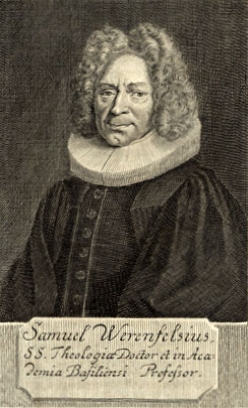Samuel Werenfels facts for kids
Samuel Werenfels (born March 1, 1657, died June 1, 1740) was an important Swiss religious scholar. He helped bring about a new way of thinking in Swiss Protestant theology. This new way focused on "reasonable orthodoxy," which meant using reason and common sense in religious beliefs.
Contents
Life of Samuel Werenfels
Samuel Werenfels was born in Basel, which was part of the Old Swiss Confederacy at the time. His father, Peter Werenfels, was a church leader. Samuel studied religion and philosophy in Basel. After that, he visited other universities in Switzerland, like those in Zürich, Bern, Lausanne, and Geneva.
When he returned to Basel, he briefly taught logic. In 1685, he became a professor of Greek. A year later, in 1686, Werenfels traveled widely through Germany, Belgium, and the Netherlands. He even traveled with a famous writer named Gilbert Burnet.
In 1687, he became a professor of rhetoric, which is the art of speaking and writing well. By 1696, he joined the religious teaching staff. He taught different subjects over time, including religious beliefs, debates, and the Old Testament and New Testament parts of the Bible.
Werenfels was asked to teach at the University of Franeker but chose to stay in Basel. In 1722, he successfully worked to remove the Helvetic Consensus in Basel. This was a very strict set of religious rules that caused disagreements. He was also a member of important groups like the Prussian Academy of Sciences and a London society that spread religious teachings.
For the last 20 years of his life, Werenfels lived quietly. He was involved in a case against Johann Jakob Wettstein for his religious views, but later said he wished he hadn't been. Samuel Werenfels passed away in Basel.
The "Swiss Triumvirate" and Their Ideas
Samuel Werenfels believed that people spent too much time arguing over small religious details. He famously wrote about how people use the Bible: "This is the book in which each both seeks and finds his own dogmas." This means people often find what they already believe in the Bible. Instead, he supported the historical-grammatical method, which focuses on understanding the Bible's original meaning and history.
Werenfels, along with Jean-Alphonse Turrettini and Jean-Frédéric Osterwald, formed what was called the "Helvetic triumvirate" or "Swiss triumvirate." They were moderate but traditional Swiss Calvinist religious scholars. Their ideas were similar to those of other groups in the Netherlands and England. They promoted simple, practical beliefs, using reason, and being tolerant of others.
They admired the "reasonable orthodoxy" of the Church of England. Turrettini especially worked against the strict Helvetic Consensus, but Werenfels made the first big step to get rid of it. These three scholars also exchanged letters with important church leaders like William Wake.
Samuel Werenfels' Writings
About Word Battles (Logomachy)
Werenfels thought that "logomachy," or arguments about words, was a big problem among scholars. He believed that these arguments often came from people's prejudices or misunderstandings of language.
In his paper De logomachiis eruditorum (published in 1688), Werenfels argued that many disagreements among Christians were just arguments over words. He thought these arguments came from pride and other human flaws. He suggested creating a universal dictionary to define all terms clearly and end these disputes.
In another speech, Oratio de vero et falso theologorum zelo, he warned against those who claim to fight for pure religious ideas but are actually fighting for their own systems. He believed that religious debaters should not focus on old, forgotten heresies. Instead, they should challenge the main problems that stop people from living a true Christian life.
His Religious Views
In 1699, Werenfels anonymously published a paper called Judicium de argumento Cartesii pro existentia Dei. In this work, he accepted Descartes' idea about how to prove that God exists.
Werenfels believed that a religious professor's main job was to help students become more religious, not just more scholarly. He thought that teaching practical religion was as important as teaching practical medicine.
He also believed that a special message from God was necessary. He defended the Biblical miracles as proof that the stories in the Bible were true. In his paper Cogitationes generales de ratione uniendi ecclesias protestantes, he looked for ways to bring together different Protestant groups, like Lutherans and Calvinists.
His work De jure in conscientias ab homine non usurpando (from 1702) supported freedom of conscience, meaning people should be free to believe what they want as long as it doesn't harm public order. This work was praised by some scholars and used by others in their own debates.
Collected Works
His collection of religious papers, Dissertationum theologicarum sylloge, first came out in Basel in 1709. Another collection of his writings, Opuscula theologica, philologica, et philosophica, was published in 1718.
Sermons and Translations
From 1710, Werenfels, who spoke German, was asked to preach in the French church in Basel. His sermons were simple and clear. People described his preaching as "elegant, understandable, and uplifting." These sermons were published as Sermons sur des verités importantes de la religion (1715). They were later translated into German and Dutch.
His paper De logomachiis eruditorum was translated into English in 1711 as Discourse of Logomachys, or Controversys about Words. Other works were also translated, including a speech about how plays can be useful in educating young people.
 | William M. Jackson |
 | Juan E. Gilbert |
 | Neil deGrasse Tyson |


